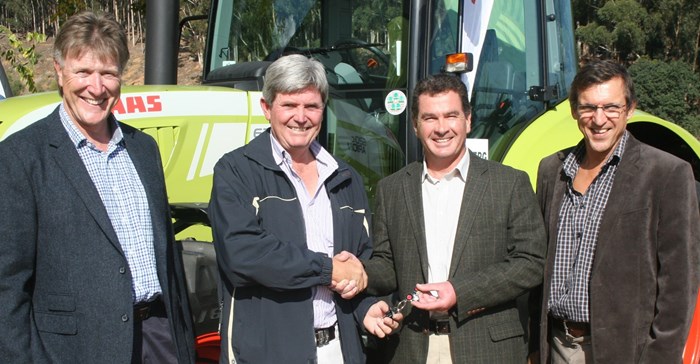
Related


Soil and water: An inseparable partnership in a changing agricultural landscape
Prof Driekie Fourie 4 Dec 2025




Top stories






More news


Marketing & Media
Ads are coming to AI. Does that really have to be such a bad thing?














However, they soon realised that they were faced with a new challenge: The department's tractor was not strong enough to handle the planter and as a result the planter could not be utilised optimally. But a few of the department's industry partners – Overberg Agri, CLAAS and Kempston Agri – came to its rescue when they handed over the keys of a CLAAS tractor to Prof Nick Kotze, head of the Department of Agronomy.
Thanks to this tractor with its improved abilities, the department will now be able to use its new minimum till plot planter to do research on industry-specific problems and to supply the agricultural community with specific answers to problems based on scientific trials.
Among other things, the Department of Agronomy is involved in research in various cereal crops that are farmed in the Western Cape winter-rainfall areas – these include wheat, oats, lupine, barley and canola. With the department's outdated equipment, the soil had to be tilled up to three times before wheat could be planted for research purposes. With the minimum tilling implement the fields only have to be tilled once.
“Industry-driven research is to the advantage of the farmer, the environment and agriculture as a whole,” explained Kotze. He quoted former American President Franklin D Roosevelt who, as long ago as the 1930s, said that: “The nation that destroys its soil destroys itself.”
André Uys, an alumnus of the Faculty of AgriSciences and managing director of the Overberg Agri Group, emphasised that partnerships form an important part of the company’s business model, especially partnerships with agricultural faculties at universities. “It is our privilege to help you because you help us,” he said. “We want to be part of the research and training process and be able to provide input.” He explained that students of the Faculty of AgriSciences not only become their clients and employees but that Overberg Agri and the farmers they serve benefit a great deal from the research that is undertaken by the faculty.
Dick David, manager of Kempston Agri who is the agent for CLAAS in South Africa, agreed with what Uys said and added that CLAAS is renowned for precision farming and efficiency. “We like to support research that enhances precision farming,” he said.
Prof Danie Brink, acting dean of the Faculty of AgriSciences, said that industry’s support is essential to enable the faculty to continue its good work. Students in the Department of Agronomy are currently working on various industry projects. A total of 38 PhD students graduated from the Faculty of AgriScience in the 2015 academic year.